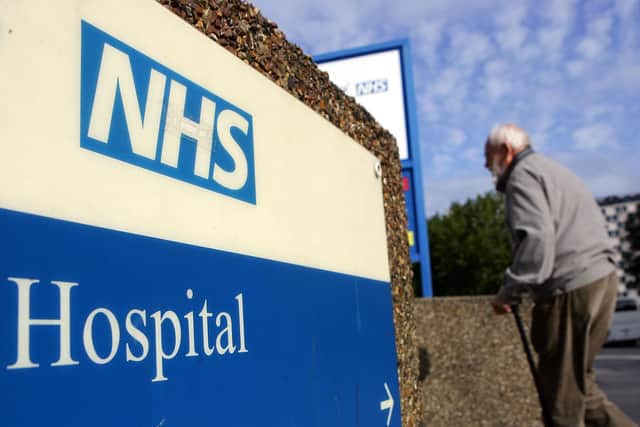How has NHS Scotland run up a £395m deficit? Austerity, demographics, Covid and staffing
NHS Scotland is facing a deficit of £395 million, the organisation’s chief executive has revealed – but why are Scotland’s healthcare finances faring so badly?
NHS funding has been a politically sensitive topic since the healthcare system’s founding in 1948 by Clement Attlee’s post-war Labour government, and the subject has been a key feature of just about every general election since then.
Advertisement
Hide AdAdvertisement
Hide AdIn modern times, there are several key issues – austerity, population changes, the coronavirus pandemic, and staffing. From 2010 to 2019, the UK Government enacted an official policy of austerity following the 2008 financial crisis and subsequent recession.


Although the NHS in England and Wales received increases in funding year-on-year – and as a result so too did the NHS in Scotland due to Barnett consequentials – during this time, health boards still had to implement cost-cutting measures as the money coming in could not keep up with the increased demand being placed on it.
Which brings us to population changes. The UK is getting older and, naturally, sicker. People over 65 years of age now make up around 20 per cent of the population.
Birth rates have fallen, meaning there are less people of working age to tax to support the care of older generations, and the migration of younger people into the UK has not kept pace.
Then, in 2020, the coronavirus pandemic hit. The NHS was already weakened by the previous decade of austerity and aforementioned population changes, but was ill prepared to deal with a global pandemic. And so the UK and Scottish governments implemented lockdown measures, which stifled the economy.
The pandemic has caused immense backlogs in the NHS, which it must now attempt to tackle while simultaneously caring for people who suddenly fall ill.
According to statistics released by Public Health Scotland, 525,654 people are waiting for outpatient procedures in Scotland, as of September 30.
And 151,093 people were waiting for inpatient or day case treatment on the same date and 151,651 were waiting for one of the eight key diagnostic tests. In total, 828,398 people were on an NHS waiting list at the end of September.
Advertisement
Hide AdAdvertisement
Hide AdThe Scottish Government has pledged over £1 billion toward Covid recovery between 2021 and 2026, and has provided an increase of £730m (6 per cent) for NHS boards in 2023/24.
The pandemic has caused a recruitment and retention crisis in healthcare, which is costing the NHS dearly.
Elderly and vulnerable patients often can’t be discharged from hospital without an adequate care plan. But with no availability of care home and community care placements due to staffing issues, these patients, who are otherwise fine to leave, end up blocking beds.
With no beds available, patients presenting at emergency departments have nowhere to go, and face incredible waits in A&E before being treated. The pressure in A&E has been unbearable for some staff, who have already lived through some of the darkest days in the NHS’s history, during the coronavirus pandemic.
In 2021/22, Audit Scotland found that NHS Scotland spent £232.22m on nursing bank staff and £88.9m on nursing agency. The issue is therefore not just financial, but structural.
Comments
Want to join the conversation? Please or to comment on this article.